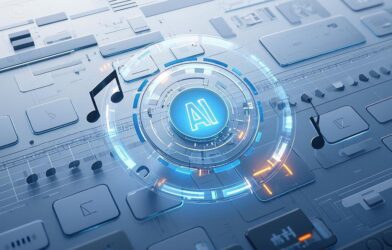Artificial Intelligence (AI) is transforming industries, revolutionizing economies, and modifying the way people interact with technology. AI has enormous potential to improve lives, from recommending social media pages to providing sophisticated health diagnostics. With such revolutionary power, however, comes a deluge of ethical questions. It is crucial that as AI becomes a bigger part of our daily lives, innovation is balanced with ethical considerations.
In this article, we will explore the major ethical challenges AI presents, including bias, privacy issues, transparency, accountability, and the risk of job displacement. We will also discuss how these issues can be addressed to ensure AI serves humanity ethically.
1. Bias and Fairness
Arguably, one of the most immediate and direct ethical issues related to AI is bias. AI systems are trained on massive datasets, which are often drawn from historical data that reflects societal disparities. This is especially evident in facial recognition technologies, where algorithms have been shown to be less accurate in identifying darker-skinned individuals, or in AI recruitment tools that may unintentionally reinforce gender or racial biases if training data is not carefully curated.
For example, research from MIT and Stanford revealed that commercial facial recognition systems had higher error rates when identifying the gender of darker-skinned faces compared to lighter-skinned ones. Such bias perpetuates stereotypes and results in unequal treatment of marginalized communities. Similarly, if an AI system used for hiring decisions is trained on past hiring practices that show a preference for male candidates, the AI may inadvertently continue to perpetuate gender disparity.
Solutions to Address Bias
There are both technical and social solutions to AI bias. Data scientists and engineers must prioritize diversity and representativeness in the datasets used to train AI models. Furthermore, AI systems should undergo continuous monitoring to detect and correct biased patterns. One solution could be adopting fairness-aware algorithms that account for disparate impact across different demographics. However, achieving fairness often involves trade-offs. Striving for maximum fairness in an AI system could sometimes reduce the model’s overall accuracy. Therefore, developers must balance fairness and performance, refining AI models to prioritize fairness while ensuring the system’s functionality is not compromised.
References:
2. Privacy Issues
The widespread adoption of AI technologies also brings significant privacy concerns. AI algorithms rely heavily on data—often personal data—collected from various sources such as smart devices, social media platforms, and other AI-driven technologies. This data, when harvested without full awareness or consent, can lead to breaches of privacy.
As AI continues to analyze vast volumes of data to predict behavior, preferences, and even personal traits, it raises ethical dilemmas about how personal information should be managed. Governments, businesses, and individuals are all at risk of exploitation by corporations or even governments. AI’s ability to compile and analyze personal information makes individuals vulnerable to surveillance, manipulation, or identity theft.
Balancing Privacy with Personalization
One of the main challenges lies in finding a balance between respecting privacy and enabling the benefits of personalized services. AI systems must incorporate data minimization strategies that limit the amount of personal information collected. Furthermore, robust encryption techniques and strong data governance policies must be developed to safeguard user privacy. Regulations like the European Union’s General Data Protection Regulation (GDPR) have made strides in this area by requiring businesses to handle personal data responsibly. However, a global standard for data privacy is still needed.
References:
- The Ethics of Artificial Intelligence and Privacy
- Artificial Intelligence and Privacy: Legal and Ethical Issues
3. Transparency and Explainability
AI systems, particularly deep learning models, are often referred to as “black boxes” because their decision-making processes are opaque, even to their creators. This lack of transparency can be problematic, especially in high-stakes domains such as healthcare, finance, and the criminal justice system. When AI is used in life-or-death decisions, such as diagnosing medical conditions or determining eligibility for loans, users must understand how decisions are made.
The Importance of Explainability
Explainability in AI means providing users with clear, understandable reasons for why an AI model made a certain decision. While ensuring transparency can be challenging, especially with complex models like deep neural networks, the push for more explainable AI is gaining momentum. For instance, in healthcare, doctors need to understand the reasoning behind AI-based diagnostic decisions to trust the system and ensure that the AI does not recommend inappropriate treatment.
To address these concerns, several techniques have been proposed, such as developing interpretable models and using post-hoc explanation methods. The aim is not only to enhance transparency but also to ensure AI systems can be validated and trusted by users.
References:
4. Accountability and Responsibility
As AI continues to take on more autonomous roles, the question of accountability arises. Who should be held responsible when an AI system makes a mistake or causes harm? For instance, if an autonomous vehicle crashes, or if AI-driven diagnostic software misdiagnoses a condition, who should be accountable—the developers, the users, or the AI system itself?
Establishing Accountability Frameworks
One of the primary ethical challenges in AI is establishing a clear framework for accountability. With increasingly autonomous AI systems, the responsibility for their actions becomes blurred. It is crucial to define who is accountable when AI systems malfunction, especially when these systems impact human lives. Governments and organizations must create legal frameworks to hold developers and users responsible for the actions of AI systems.
Moreover, robust governance systems are necessary to monitor AI’s use and ensure adherence to ethical standards. This framework should also include provisions for potential abuse of AI technologies, such as surveillance or exploitation.
References:
- AI Accountability: Ethical Dilemmas in Autonomous Systems
- Artificial Intelligence: Accountability for Autonomous Systems
5. Job Displacement and Economic Inequality
AI’s potential to automate jobs across various sectors, including manufacturing and service industries, raises significant concerns about job displacement and economic inequality. While AI can create new job opportunities in fields like AI development and data science, these new roles will not necessarily replace the jobs lost, especially for workers in low-skilled, repetitive positions.
Addressing Job Loss and Economic Inequality
To mitigate the negative impact of AI on the workforce, society must proactively develop programs aimed at reskilling displaced workers and providing fiscal relief. Education and training initiatives can help workers transition into new fields, while government policies could include universal basic income or similar measures to address economic inequality.
The solution involves finding a balance between technological advancement and social justice. Governments, industries, and educational institutions must collaborate to create an inclusive workforce that is prepared for the AI-driven future.
References:
Conclusion: Finding the Right Balance
AI offers enormous potential for progress but also presents significant ethical challenges. Issues such as bias, privacy violations, lack of transparency, accountability, and job displacement must be carefully managed. The ethical integration of AI requires balancing innovation with responsible governance.
As AI technology evolves, it is imperative that developers, policymakers, and society engage in open dialogue to ensure that AI is used for the greater good. Ethical guidelines and regulatory frameworks must be established to ensure that AI systems operate in ways that respect human rights and values.
The optimal future for AI will involve fostering technological growth while upholding the principles that protect our humanity. By addressing these challenges, AI can improve our world, creating a future where technology and ethics coexist harmoniously.













